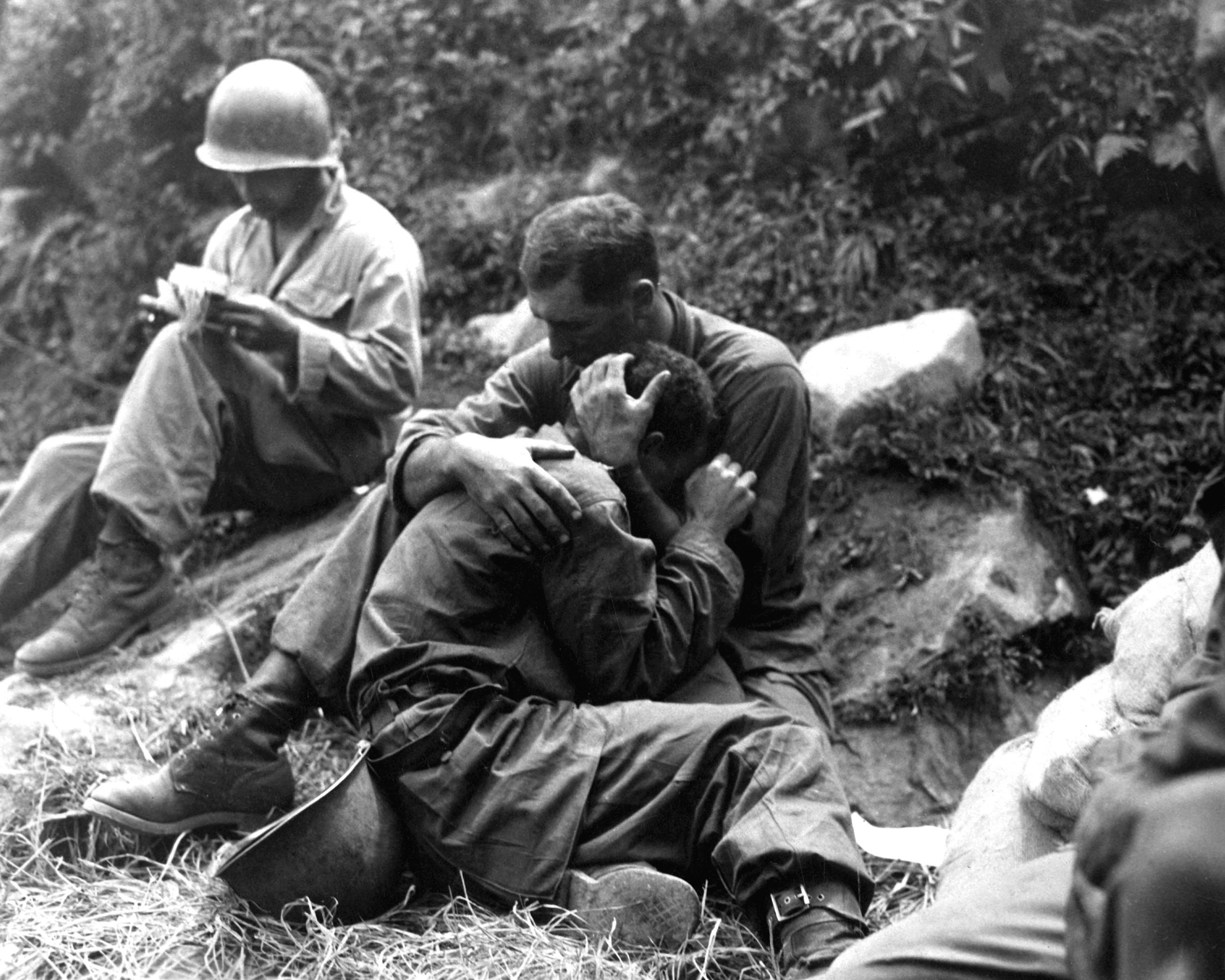Sunday, October 12, 2014
GOODNIGHT, FUCKERS #87: A PICTURE THAT WILL ALWAYS GET TO ME
This is a hard picture for me to look at because it embodies an emotion I don't know if I can describe. It drives me to tears every time I see it. The desperate sorrow and fear is palpable, and it strikes me on a very basic human level.
I talked about masculinity last night, and when it comes right down to popular opinion, there is nothing more masculine than war, especially an older one like the Korean War, during which the picture above was taken. People--mostly older guys--bitch and moan about modern values, and they like to think back to a time "when men were men." That's a glaringly sexist comment, but never mind that for now. I'm thinking about its implications about the past. It suggests that there was a time when men were the embodiment of all things considered masculine. All men, except for a handful of degenerates, of course.
But that's simply not true. All you have to do is look at this picture. Imagine taking it out of its context. Take away the war and put this photo in a less masculine (but definitely testosterone-driven) situation like, say, a football game. Anyone else would point and laugh at these two guys and probably question their sexuality.
If something like this happened during the time when men were supposedly men, then I'm pretty sure that the time most older guys mourn for probably didn't really exist, at least not outside of movies and TV.
I've never been on a battlefield, at least not while the battle was going on. (I once walked the Chickamauga site, but that was about 140 years after the Civil War.) However, I tend to trust the reports from people who actually saw action. My favorite observation comes from William Tecumseh Sherman. Everyone knows he said, "War is Hell." Not everyone knows the whole quote, which reads as follows: "I've been where you are now, and I know just how you feel. It's entirely natural that there should beat in the breast of every one of you a hope and desire that some day you can use the skill you have acquired here. Suppress it! You don't know the horrible aspects of war. I've been through two wars, and I know. I've seen cities and homes in ashes. I've seen thousands of men lying on the ground, their dead faces looking up at the skies. I tell you, war is Hell!"
Those of us who have never been in a soldier's boots will never understand. We can only come close to getting it. From everything I've read, war is a horror beyond all imagination.
Knowing this, it's suddenly easy to see a soldier breaking down. And only another soldier possesses enough understanding to comfort him.
That's what gets to me about this photograph. It's the true embodiment of the psychological effect on the survivors of war. It's not traditionally masculine to break down in the wake of incredible and shocking violence. It's certainly not traditionally masculine to comfort a man who breaks down in such a way.
But here's the thing: traditional masculinity can go fuck itself. Actual masculinity? You're looking at a picture of it right now. I don't know what happened to these two guys after this photo was taken, but I know that shortly after, they got back up and in the face of fear and misery, they continued fighting the war, knowing that it would probably lead to their own destruction.
I hope to never walk in their boots.
PS: Here's another case in point. I don't know how many of you remember Audie Murphy. My older readers will remember him as possibly the manliest man of the 20th Century, but once upon a time, he was a great movie star. He was usually in war or western pictures. However, he was also the most decorated soldier of WWII, a war that embodied the idea of a time "when men were men." Murphy was in an unusual position, though. He wrote an autobiography about his time overseas called TO HELL AND BACK (and it's a great book, which I highly recommend). They even made a movie out of it . . . starring Audie Murphy as himself. Freaky, right?
Here's the problem: Murphy suffered deeply from combat shock, what we now call PTSD. He suffered so badly from it that it was reported that when he saw the movie based on his real life experience--starring himself, no less--he broke down and couldn't watch. As a result of his time in the war, he suffered from drug addiction, which was chief among his other self-destructive tendencies. There was talk that there might be a sequel to that movie, one that would depict his time after the war as he tried to fit in as a citizen, but he was very reluctant to show how fucked up he really was. Which, by the way, is an ugly reaction to the stereotype of the manly man. This guy kept a lot of pain in because he was afraid of how the rest of the world would view him if he let it out. That is not a healthy practice. It usually leads to more self-destructive behavior, which is how it worked out in Murphy's case.
By the time he died in a plane crash, it was probably a relief to him, all things considered. Does this sound like someone who lived during a time when men were men?
Subscribe to:
Post Comments (Atom)

No comments:
Post a Comment